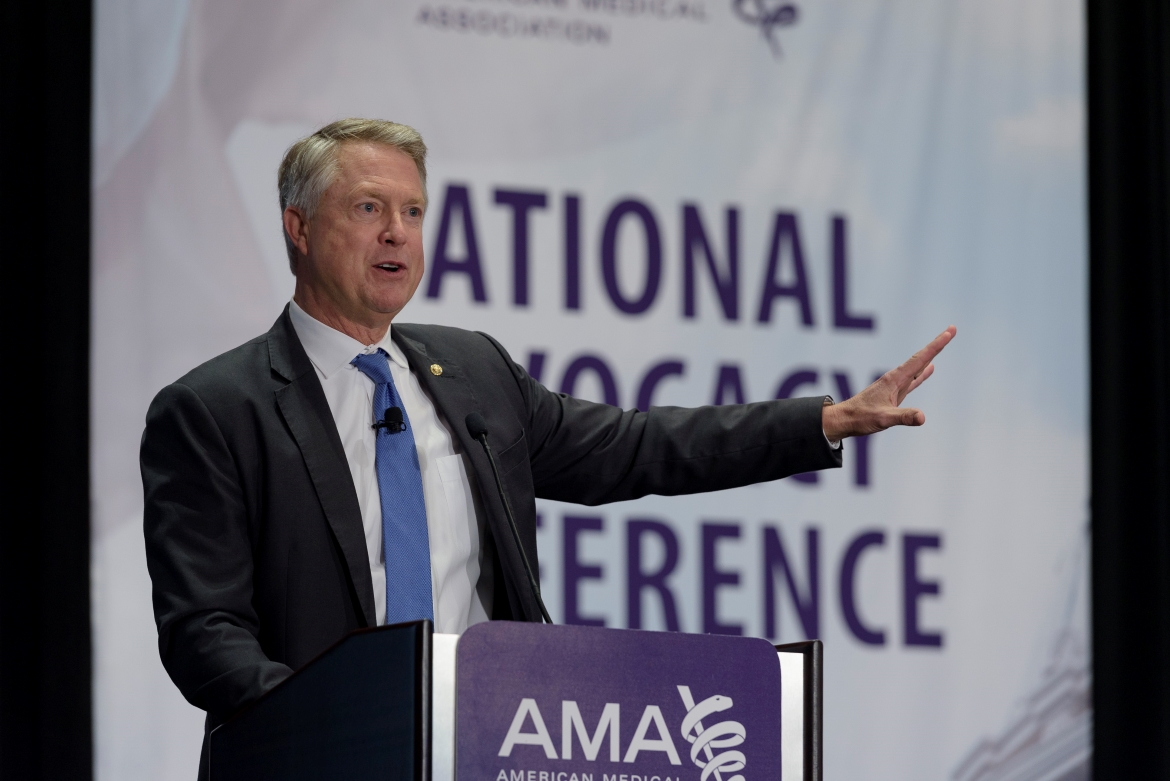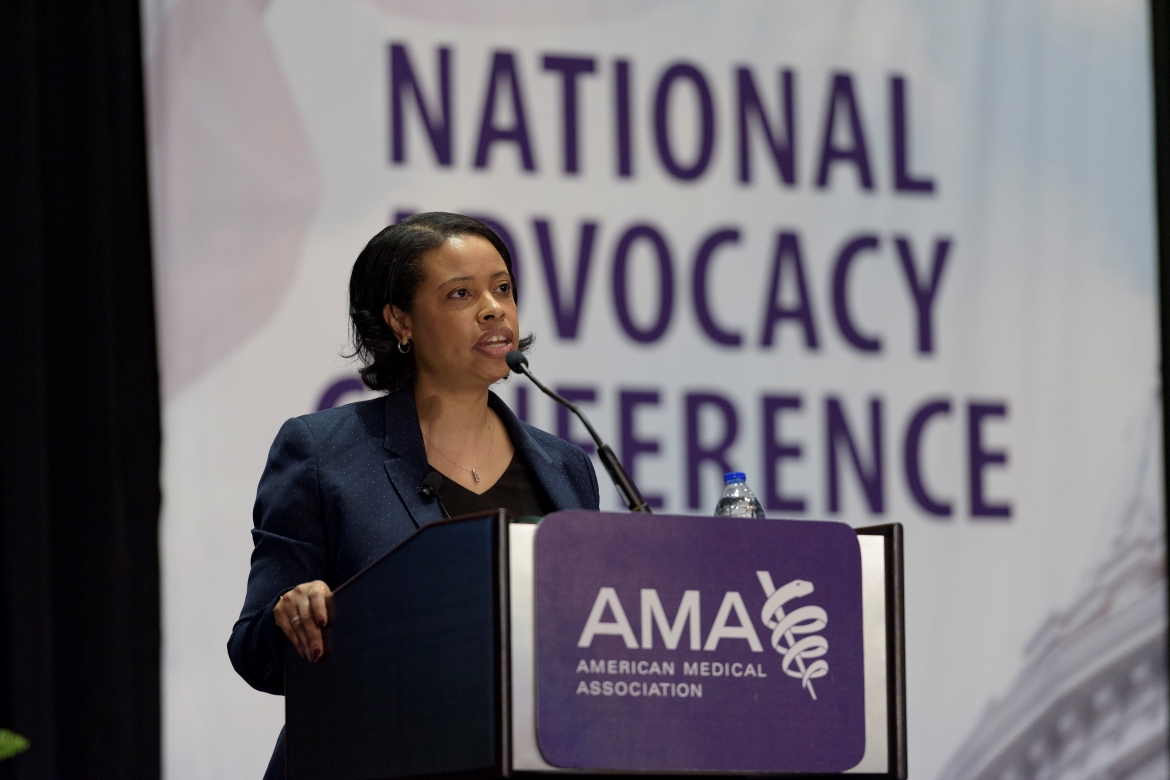Contents
- FDA: In favor of OTC naloxone
- Physicians unify to protect patients
- Outstanding Government Service Awards
- Transition to value-based payment
- Implementation of drug price inflation rebate program
- Health equity focus in draft cost measures
- Initial set of TEFCA QHINs
- Being honest about needing care brings systemic, supportive changes
- U.S. DOE proposed rule improves student loan repayment terms
- More articles in this issue
- Essential Tools & Resources
FDA advisory panels vote 19-0 in favor of OTC naloxone
Two U.S. Food and Drug Administration (FDA) advisory panels last week voted 19-0 to recommend to the FDA that naloxone, the overdose-reversing drug, be available over the counter.
“Making naloxone over the counter is a safe and vital step to ending the nation’s overdose epidemic,” testified Bobby Mukkamala, MD, chair of the American Medical Association Substance Use and Pain Care Task Force. “This will help community-based organizations purchase and distribute naloxone to those who need it most. Rather than sitting behind a pharmacy counter, naloxone needs to be readily available to save lives.”
In his testimony, Dr. Mukkamala emphasized the AMA’s longstanding support and public advocacy (PDF) for making naloxone available over the counter. Dr. Mukkamala also urged—if the OTC application is approved by the FDA—manufacturers to responsibly price the life-saving medication as well as for health insurance companies and other payers to continue to cover the medication at low- or no-cost.
“We urge the FDA to make a speedy and final determination in favor of over-the-counter access,” said Dr. Mukkamala.
More information, including links to detailed information and a video of the hearing, is available from the FDA. Dr. Mukkamala’s testimony can be heard at 4:34:50 of the recording.
Amid political divisions, physicians unify to protect patients
For the first time since the pandemic’s onset, physicians, medical society staffers and others met in person in a bitterly divided Washington, D.C., for the AMA National Advocacy Conference.
This year’s legislative and regulatory priorities are crystal clear, driven by the urgent need to protect patients’ access to high-quality care and help physicians who have put so much on the line during the COVID-19 pandemic.
“Everything is very politicized right now and ... there's so much division in Washington, and in our country,” AMA Senior Vice President of Advocacy Todd Askew said in an episode of “AMA Update” filmed on site at the conference.
“That's just magnified here in D.C.,” Askew noted. “But these issues that we're talking about ... there's strong bipartisan support for every single one of them. Regardless of the political divisions, everybody agrees that the Medicare program should be financially stable and that physicians should be able to afford to care for those patients. Everybody agrees that physicians should not spend hours, and hours and hours and their staff spend hours, and hours and hours filling out unnecessary paperwork to get people authorization for benefits that they already paid for.”
The bipartisan nature of the AMA Recovery Plan for America’s Physicians was reflected in the speaking docket for the conference. Kansas Republican Senator Roger Marshall, MD, an ob-gyn, told the physicians and others gathered why he has co-sponsored the “Improving Seniors’ Timely Access to Care Act” to fix prior authorization burdens in Medicare Advantage.
Meanwhile, Democratic Senators Amy Klobuchar, of Minnesota, and Sheldon Whitehouse, of Rhode Island, addressed priorities such as the need to ensure that Medicare physician payment keeps pace with inflation and that financial incentives for alternative payment models continue (PDF).
[Additional speakers from the administration included:
- Chiquita Brooks-LaSure, administrator, Centers for Medicare & Medicaid Services
- Rachel L. Levine, MD, Admiral, U.S. Public Health Service, Assistant Secretary for Health, U.S. Department of Health and Human Services
- Rahul Gupta, MD, MPH, MBA, FACP, director, White House Office of National Drug Control Policy]
During their visit to the nation’s capital, physicians and others attending the conference paid visits to their representatives’ congressional offices and made use of an AMA action kit (PDF) with key facts to support their advocacy on:
- Medicare physician payment reform (PDF)
- Scope of practice (PDF)
- Graduate medical education (PDF)
For more information, read the full story from Kevin B. O’Reilly, AMA news editor.
AMA grants six Outstanding Government Service Awards
At last week’s 2023 AMA National Advocacy Conference, six recipients were honored with an AMA Award for Outstanding Government Service. The AMA Awards honor elected officials and career public servants at the local, state and federal levels for significant accomplishments to advance public health.
This year’s recipients included:
- Thomas C. Alexander, South Carolina Senator
- Alisha R. Bell, chair, Wayne County Commission, Michigan
- Kevin Brady, former U.S. Representative from Texas
- Rahul Gupta, MD, MPH, MBA, FACP, director, White House Office of National Drug Control Policy
- Debra Houry, MD, MPH, chief medical officer and deputy director of program and science, Centers for Disease Control and Prevention
- Wendell Primus, PhD, former senior policy advisor to former House Speaker Nancy Pelosi
View the links for more information on the work of each award recipient.
AMA, others call on Congress to do more to support transition to value-based payment
The AMA, along with 11 other leading provider organizations, recently sent a letter (PDF) to congressional leadership thanking them for past actions to promote value-based care, including answering calls by the AMA and others late last year to extend the expiring incentive payments for advanced alternative payment model (APM) qualified participants for an additional 12 months. The letter, sent Feb. 13, also called on the new Congress to take further action to drive longer-term system transformations. Specifically, it asks Congress to:
- Extend certain value-based care incentives
- Remove regulatory barriers
- Provide technical assistance to model participants
- Implore CMS to improve financial methodologies and establish a more stable, predictable APM pathway
- Promote greater multi-payer APM alignment, particularly between Medicare Part B and Medicare Advantage plans
The AMA is working with the other organizations on the letter to reintroduce the Value in Health Care Act in Congress in the coming months. Among other provisions, the Act would seek to further extend the APM incentive payments beyond 2023, create more flexibility in determining those who qualify, and provide additional upfront funding opportunities.
CMS moves toward implementation of drug price inflation rebate program; releases report on value-based drug payment
The Centers for Medicare & Medicaid Services (CMS) is moving toward implementation of several pieces of drug pricing policy included in the Inflation Reduction Act of 2022 (IRA). Earlier this year the agency released a proposed timeline for its work on creating the new Medicare drug price negotiation program, and on Feb. 9 released additional guidance for the drug price inflation rebate program. The inflation rebate program will require that prescription drug manufacturers pay rebates to the Medicare program when their drug price increases outpace the rate of inflation. The first periods for which rebates will be required began at the end of 2022 for some Part D drug and on Jan. 1 for some Part B drugs, with CMS planning to send the first rebate invoices to manufacturers in 2025.
CMS’ Innovation Center (CMMI) also released a long-awaited report on value-based drug payment, rolling out three new drug payment models aimed at lowering drug costs. The three new models that CMMI will test include one aimed at drugs approved under FDA’s accelerated approval pathway, one aimed at capping out-of-pocket costs for certain generic medications at $2 per month, and one aimed at creating outcomes-based payment arrangements for ultra-high-cost gene and cell therapies. The AMA is closely monitoring CMS’ implementation of the IRA’s drug pricing provisions and continues to work closely with CMS on policies to meaningfully impact the high price of prescription drugs.
AMA urges health equity focus in draft cost measures
In response to five draft episode-based cost measures for potential use in the Medicare Merit-based Incentive Payment System (MIPS), the AMA urged CMS and its contractor, Acumen LLC, to ensure that the measures take a health equity focus. As the agency develops kidney disease and management cost measures, the AMA noted it is not clear how past use of a race-based formula and the still inconsistent use of successor formulas are accounted for in the measures to avoid penalizing and instead incentivize physicians who are caring for patients who have previously had care delayed by the use of the old formula.
The AMA also raised health equity concerns about the prostate cancer and rheumatoid arthritis draft cost measures and urged CMS to:
- Stratify for reporting
- Highlight persistent disparities that need to be addressed
- Risk adjust for payment to avoid penalizing physicians that care for marginalized and minoritized communities.
Finally, the AMA continues to strongly oppose the inclusion of Medicare Part D prescription drug costs in cost measures, as holding physicians accountable for costs that they do not set or negotiate is fundamentally problematic.
HHS announces initial set of TEFCA QHINs
On Feb. 13, the Department of Health and Human Services (HHS), Office of the National Coordinator for Health IT (ONC) and the Sequoia Project announced the first set of Qualified Health Information Networks (QHINs) for the Trusted Exchange Framework and Common Agreement (TEFCA). The 21st Century Cures Act (PDF) created TEFCA as a voluntary network, and HHS believes that TEFCA is going to help improve information exchange on a nationwide scale and provide a floor for exchange by establishing a standardized approach and a common technical framework for all users of the network.
The six initial QHINs are: CommonWell Health Alliance, eHealth Exchange, Epic, Health Gorilla, Kno2 and the KONZA National Network. These organizations are now in the testing and onboarding phase to become a QHIN and will “go-live” on the TEFCA Network within the next 12 months. More details about TEFCA are available online.
Being honest about needing care brings systemic, supportive changes
As an emergency medicine resident, Stefanie Simmons, MD, did not plan on experiencing post-partum depression following the birth of her second child. But she also did not seek care—a decision that, to this day, she attributes to the harmful belief that physicians should power through any and all obstacles because physicians are supposed to be immune from personal crises.
“I was young, ambitious and devoted to my career,” said Dr. Simmons. “I loved being an emergency medicine (EM) physician because I was in the middle of the action and helped save lives in traumatic situations. What I didn’t realize, however, is that I needed support—and that I wasn’t alone.”
Dr. Simmons continued as an EM physician but recognizes that her experience of depression lasted much longer than necessary because of her lack of care. As she recovered, she learned more about the resources available and began to look at how she could help her colleagues. As her career progressed, she realized that she could not only model the types of actions that would help her students and colleagues but that broader action was needed.
“I eventually started to help develop physician coaching and peer support programs through my medical group—sharing my story when appropriate and listening to what my colleagues were going through. It’s difficult to ‘teach’ a physician that it is okay to say, ‘I’m not okay,’ when there’s trauma or stress. One of the keys is that there needs to be a place to say it,” said Dr. Simmons. “We need to build peer relationships, model supportive behavior, and build hospital and health system cultures that encourage clinicians to seek care. When we take care of ourselves and each other, we’re in a better position to care for our patients and community members who rely on us.”
Dr. Simmons acknowledges that a fully developed wellness program to accomplish these goals takes time, investment and institutional support. While her coaching work grew, she also realized that her hospital’s credentialing application asked prospective applicants to reveal whether they ever had a past diagnosis of a mental illness—information that has no bearing on whether a physician has a “current” impairment that adversely affects patient safety or demonstrates a physician’s ability to safely practice medicine.
“Physicians are justifiably concerned that if they are forced to disclose that they have received treatment or counseling in the past that they will be judged harshly by their peers and institution,” said Dr. Simmons. “I had no idea that I would need help after the birth of my baby, but I was acutely aware that revealing it could hurt my career. It took me longer to recover without care and could have led to impairment.” Many life events, including traumas incurred in the process of providing medical care to patients, can cause a clinician to need mental health care. Clinicians are not immune to mental health conditions.
Dr. Simmons has been determined to change the system for the better. As the vice president of clinician engagement for Envision Healthcare, a national medical group comprised of thousands of physicians and advanced practice providers, Dr. Simmons worked with senior administrative and physician leaders to build a comprehensive wellness and mental health program that empowers clinicians to thrive. Part of that program includes ensuring Envision’s credentialing application does not require physicians or other health care professionals to reveal a history of a mental illness.
“They understood the importance, and it wasn’t really all that difficult to make sure we have the most appropriate questions. We just had to have an open, honest discussion,” said Dr. Simmons.
Changing the questions from a focus on “past diagnosis” to one on whether there is a “current impairment” sends a clear message to everyone that it is safe to seek care, said Dr. Simmons, who delivers this message across the country in her newly added role as the chief medical officer of the Dr. Lorna Breen Heroes’ Foundation. As chief medical officer, Dr. Simmons is leading with a physician’s perspective on the Foundation’s goal to educate, advocate and advance solutions to health care worker burnout and to reduce health care worker suicide.
“It’s exciting to take what we did throughout Envision and work with other national leaders to make these changes in other states and other health systems,” said Dr. Simmons. “This is work that will help make us a healthier country.”
U.S. Department of Education proposed rule improves student loan repayment terms
The AMA supports efforts to ensure that individuals are offered fair loan terms and are provided with the ability to make meaningful progress toward paying off their student loans. As such, the AMA applauds many of the proposed changes in the Improving Income-Driven Repayment for the William D. Ford Federal Direct Loan Program proposed rule recently published by the U.S. Department of Education. However, the AMA did urge the Department to provide additional relief for physicians within the proposed changes. In part the AMA:
- Urged the Department to ensure that resident physicians are included in the benefit of paying no more than 5% of their discretionary income
- Asked for special repayment plans to be created for physicians
- Asked that physicians be included in changes that would create lower required student loan repayment amounts
- Pushed for the amount of exempted income for residents to be increased
For the AMA’s complete comments please see the full comment letter (PDF).
More articles in this issue
- Feb. 24, 2023: Advocacy Update spotlight on prior authorization in Medicare Advantage
- Feb. 24, 2023: State Advocacy Update
Table of Contents
- FDA advisory panels vote 19-0 in favor of OTC naloxone
- Amid political divisions, physicians unify to protect patients
- AMA grants six Outstanding Government Service Awards
- AMA, others call on Congress to do more to support transition to value-based payment
- CMS moves toward implementation of drug price inflation rebate program; releases report on value-based drug payment
- AMA urges health equity focus in draft cost measures
- HHS announces initial set of TEFCA QHINs
- Being honest about needing care brings systemic, supportive changes
- U.S. Department of Education proposed rule improves student loan repayment terms
- More articles in this issue








